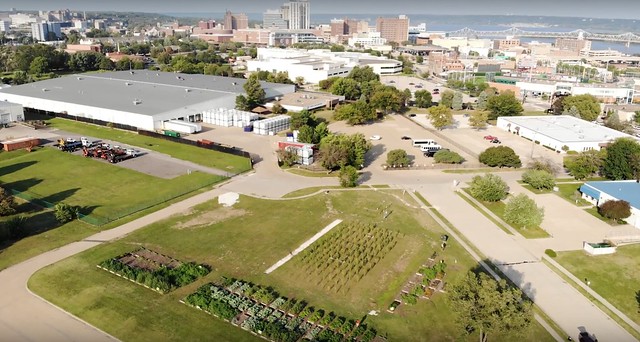
Deep in the heart of the Corn Belt, a different kind of agriculture is taking root in the city of Peoria, Illinois. Back in 2016, USDA’s Natural Resources Conservation Service (NRCS) awarded Chicago-based Greenprint Partners a Conservation Innovation Grant (CIG). Partnering with the city and other local community groups, a long-vacant lot in downtown Peoria has been transformed into a vibrant community gathering space with green infrastructure, an urban forest, and a working farm.
Well Farm, covering 1.5 acres, was engineered and contoured to optimize stormwater management. Vegetables and flowers are grown in raised beds and later sold at the Peoria farmers market. The planted trees are hybrid poplars, a fast-growing species that take up a lot of water and can ultimately be harvested for timber. Well Farm is one of the nation’s first stormwater farms, capturing stormwater runoff while growing harvestable timber and vegetables. The farm is fully instrumented to measure the site’s success in managing stormwater.
You may view the below video or visit the The Well Farm video about the project.
It is not just the citizens of Peoria that have recognized the value of this project, Greenprint Partners was awarded the prestigious U.S. Water Prize (PDF, 222 KB) in the Private Sector category for its work in advancing the way stormwater is managed for partner City of Peoria, Illinois. Greenprint Partners was recognized for its leadership as the project developer and program manager for an innovative stormwater management system and community engagement program at Well Farm. The project’s mix of green features, underground storage, and urban agriculture prevents more than a million gallons of stormwater from entering Peoria’s combined sewer each year.
Greenprint Partners process engaged a team of more than 20 community stakeholders to ensure alignment, positive neighborhood impacts, and ongoing project success. The project transformed the property, and also delivers $1.50 in economic activity for every $1 invested. It has created nearly 30 full-time jobs.
Through the Conservation Innovation Grants (CIG) program, NRCS funds projects that develop innovative approaches and technologies for natural resource conservation on agricultural lands. These grants have funded more than 60 environmental markets projects, including a number of the nation’s leading market efforts.
Find out more about NRCS Conservation Innovation Grants.



